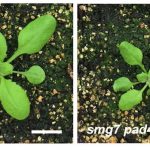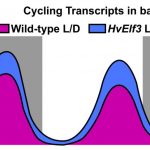METHYLTRANSFERASE1 and Ripening in Vivipary
 During fruit ripening in tomato and other flowering plants, the seeds contained within the fruit normally become dormant. However, under certain physiological conditions, seeds can germinate within fruits, a phenomenon called vivipary. Vivipary can substantially reduce yield and product quality in vegetables, grain, and fruit crops, thus posing a threat to global food security. In the course of studying the non-ripening phenotype of a tomato epimutant Colorless non-ripening (Cnr), Yao et al. (10.1104/pp.20.00499) serendipitously observed that a deficiency in DNA methylation affected not only fruit ripening but also the growth of viviparous seedlings within the Cnr fruits. Cnr results from a spontaneous epimutation that causes hypermethylation in the promoter of CNR, a gene that encodes the SQUAMOSA promoter-binding protein-box transcription factor SPL-CNR. To further examine the epigenetic regulation of vivipary in tomato fruits, the authors examined the effects of silencing
During fruit ripening in tomato and other flowering plants, the seeds contained within the fruit normally become dormant. However, under certain physiological conditions, seeds can germinate within fruits, a phenomenon called vivipary. Vivipary can substantially reduce yield and product quality in vegetables, grain, and fruit crops, thus posing a threat to global food security. In the course of studying the non-ripening phenotype of a tomato epimutant Colorless non-ripening (Cnr), Yao et al. (10.1104/pp.20.00499) serendipitously observed that a deficiency in DNA methylation affected not only fruit ripening but also the growth of viviparous seedlings within the Cnr fruits. Cnr results from a spontaneous epimutation that causes hypermethylation in the promoter of CNR, a gene that encodes the SQUAMOSA promoter-binding protein-box transcription factor SPL-CNR. To further examine the epigenetic regulation of vivipary in tomato fruits, the authors examined the effects of silencing
METHYLTRANSFERASE1 (SlMET1) on vivipary. The silencing of this gene was observed to promote precocious seed germination and seedling growth in Cnr fruits. The vivipary observed in Cnr was associated with decreases in the levels of abscisic acid, a seed dormancy-inducing plant hormone, as well as the mRNA encoding the abscisic acid biosynthesis enzyme 9-cis-epoxycarotenoid-dioxygenase (SlNCED). The authors propose that there may exist an epigenetic SlMET1→SlNCED→ABA pathway and a ripening-associated genetic pathway that independently function to prevent the occurrence of vivipary in order to guarantee the production of mature seeds during tomato development and fruit ripening. Disruption of either pathway alone would not cause vivipary; this explains why vivipary was only induced in Cnr fruits with knockdown mutations in SlMET1 or SlNCED.



